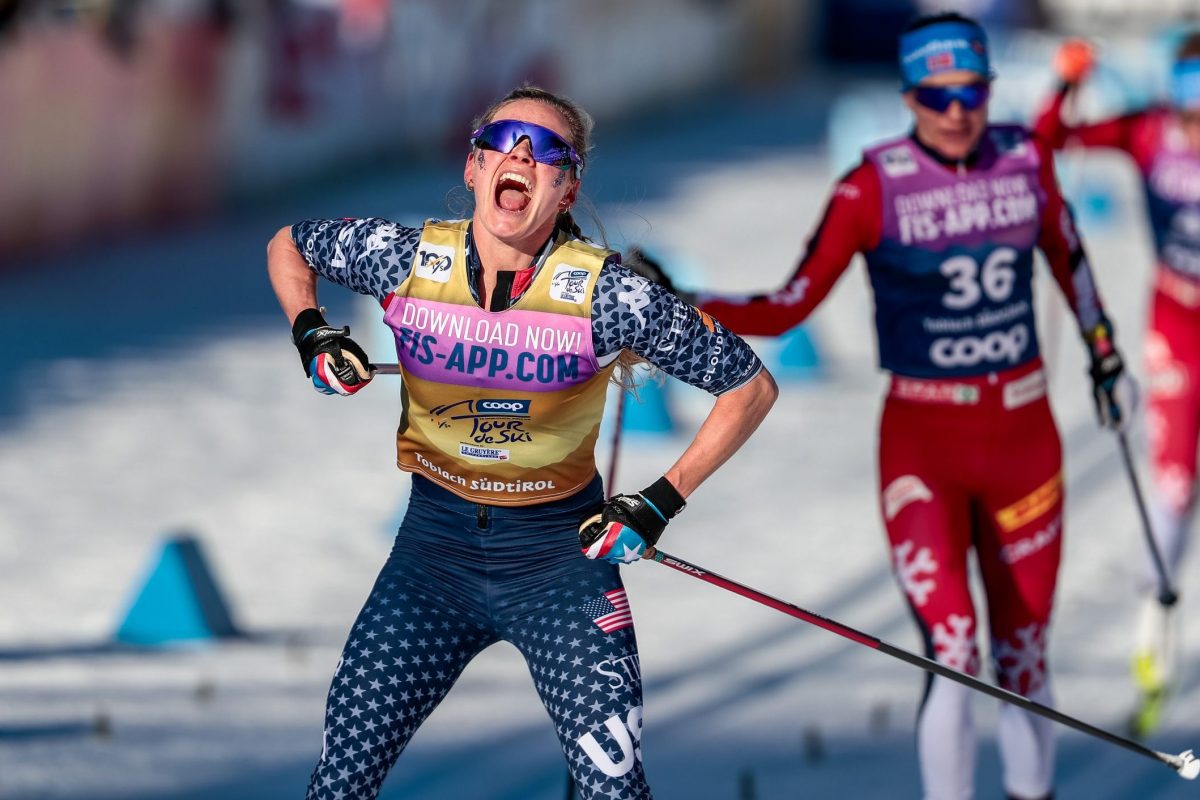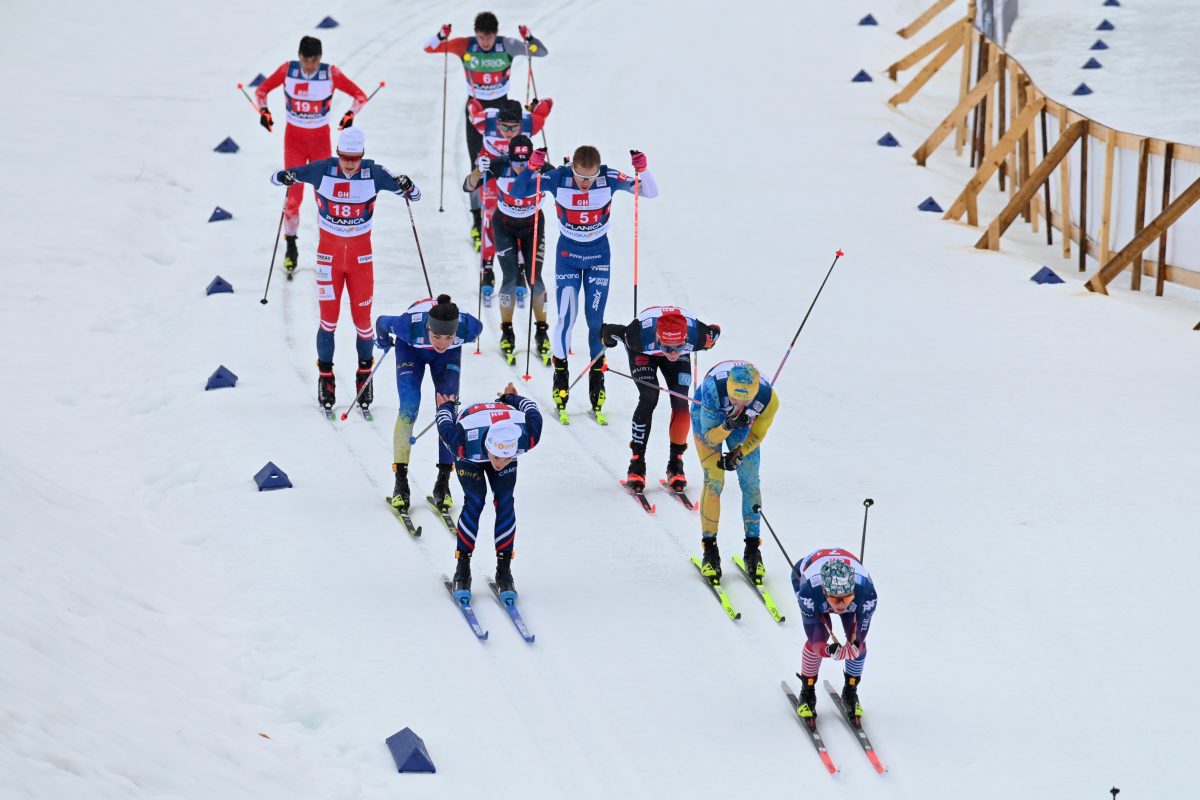
The next time the women’s 15-kilometer individual race is scheduled on the IBU’s World Cup competition calendar will be at the 2016 World Championships in March in Oslo, Norway.
Italy’s Dorothea Wierer will be one of the favorites there after winning Thursday’s 15 k individual World Cup race in Ruhpolding, Germany, in 40:19.9 minutes, and thereby repeating her success in the same discipline from earlier this season in Östersund, Sweden. The 25 year old shot with both speed and accuracy to clean all 20 targets, securing the second World Cup victory of her career.
All biathlon races are heavily influenced by shooting, but in the somewhat old-fashioned individual discipline, misses are that much worse. Each missed target tags one minute onto the competitor’s time, in place of them skiing a penalty lap or being allowed to use spare rounds. This steep penalty leads many athletes to shoot more deliberately than in a sprint, for example. Not so for Wierer.
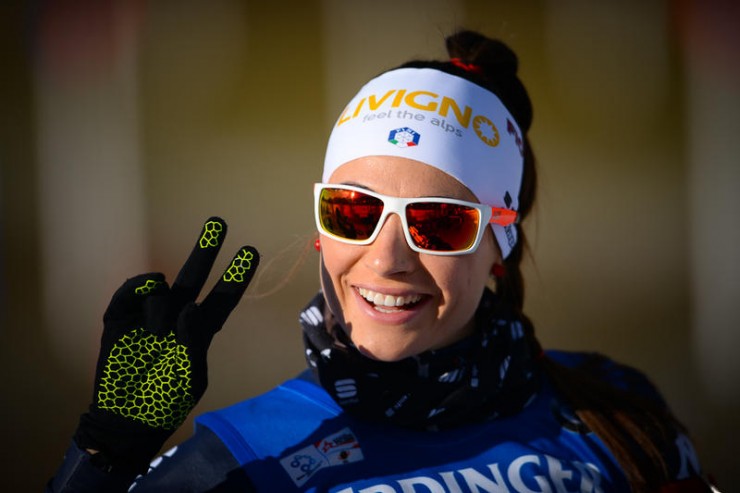
“I usually shoot zero [misses] when I shoot faster, I don’t know why,” Wierer told Germany’s ZDF, with a laugh. “Maybe because I don’t think about it, it just works all by itself.”
“I don’t even like [individual] that much,” she added in the IBU’s post-race press conference. “It is too long, and I have so much time to think about it during the race.”
Wierer won by nearly a minute, finishing 54.9 seconds faster than Finnish runner-up Kaisa Mäkäräinen, who had one penalty in her first shooting and posted the second-fastest overall course time.
“It is my first time ever in Ruhpolding that I’m better than third place, so I am happy about that,” Mäkäräinen said at the press conference. “I am not thinking about the mistake today, one miss in four shootings is a good result. … I was not skiing that fast in the first four loops, so I had some energy left.”
Third place went to Gabriela Soukalová of the Czech Republic, 1:09.9 minutes back with one penalty. Soukalová posted the best initial times starting early with bib 7, before Mäkäräinen and later Wierer improved on them. She retained the “yellow bib” of the overall World Cup leader.
“I think I am getting older. I know what I want to do many times better than a couple years ago,” Soukalova said of her race and season so far at the press conference. “And I think I was training harder than the last seasons, so maybe that’s the reason. … I am very happy that I can race like this.”
Canada’s Rosanna Crawford recorded the best North American result in 18th (+2:52.6), with two penalties (0+1+1+0).
Almost 10,000 fans packed the stands in the arena in Ruhpolding on Thursday, with several thousand more out on the course.
“I love racing in Ruhpolding, the fans are great and cheer for everyone from every country,” Crawford wrote in an email. “They take the effort to learn our names and wherever you go there are people cheering GO CANADA! It’s really a fun atmosphere!”
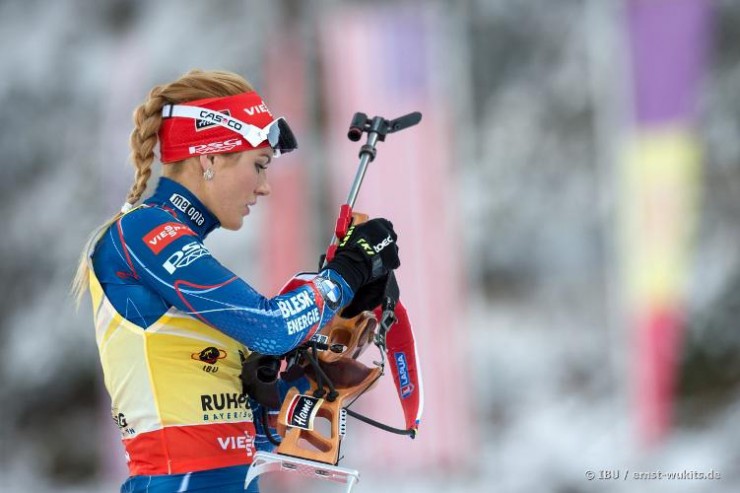
Gabriela Soukalová on her way to third in the IBU World Cup women’s 15 k individual in Ruhpolding, Germany. (Photo: IBU/Ernst Wukits)
Before the holiday break, the the IBU polled athletes on their “favorite biathlete (not yourself)”. Norwegian legend Ole Einar Bjørndalen and perennial World Cup leader Martin Fourcade of France received several mentions, but Norwegian Tarjei Bø had someone else in mind, even above his brother Johannes:
“My favorite biathlete would be Dorothea Wierer,” Bø said. “She’s a funny woman, she’s a good biathlete, and I love to watch her race because she is one of the few girls who are really attacking on the shooting range. She’s a fast shooter, and a great shooter, and also she likes to have fun. So yeah, I like her.”
Thursday’s race was a good exhibit for that assessment. Wierer recorded the fastest shooting and range times, faster than many athletes are able to do in a sprint or pursuit, despite the one-minute penalty for each miss.
“I don’t know why, that sometimes happens,” Wierer said in her interview with ZDF. “When I think too much, the mistakes come.”
By winning both individual races this season, the Italian retains the “red bib” of the discipline leader.
“Honestly, I was expecting to wear it today for the last time,” Wierer said. “But four times zero [misses], that’s as good as it gets today.”
Last summer, Wierer supported an Italian charity providing disaster relief to victims of the earthquake in Nepal earlier that year, asking for donations for a chance to win her wedding dress. She had worn it in May, walking through an “archway of skis,” held by family and friends, including her teammates, after the ceremony.
Race conditions on Thursday were sunny (though much of the course is in the continual shadow of a mountain range) with fairly calm winds, unlike the snowstorm that plagued the men’s race on Wednesday.
“Thankfully it wasn’t as bad as the men had it yesterday, we were really lucky for that. I’m still feeling the effects of my illness [over the Christmas break], but it’s improving from week to week,” Wierer said of her skiing to ZDF, after recording the 11th-fastest course time on Thursday. “In the second and third loop today, I thought to myself, ‘Oh, I’m really tired, will I be able to make it?’ But yeah, then I fought through it, and am really happy.”
“I like these conditions very much, because there was no deep snow, so this is very comfortable to race,” Soukalová said. “Even though I felt like I was getting slower and slower.”
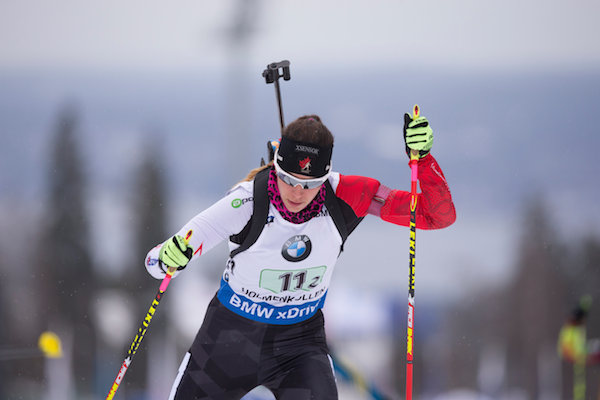
“Today we were a lot luckier than the men, it was hard packed and fair conditions for the whole race,” Crawford agreed in her email. “I didn’t get to race the Ruhpolding World Cup last year due to sickness, so it was a new track to me. I liked it, but the downhills are a bit easier than 2 years ago, which is too bad, because I for sure excel at downhills compared to most women!”
Fourth place and 0.9 seconds off the podium, Germany’s Franziska Hildebrand missed a shot in her first prone, but was still in contention for a spot on the podium in the final shooting. There she could be seen struggling before the final shot, having to get out of and back into her stance.
“For my last shot, so from four to five, somehow my breathing didn’t quite work out,” Hildebrand told ZDF. “Then I had the opportunity, I could have pulled the trigger two or three times already. I did not pull it, and instead decided to breathe deeply again, in order to really make the shot.”
Asked if that decision was a result of her increased experience instead of just firing a likely miss more quickly, she added: “Probably. In the last days it really dawned on me again how important a flawless shooting on the range has become. Especially in the individual, how much a [penalty] minute hurts, so it was really worth it to wait a bit.”
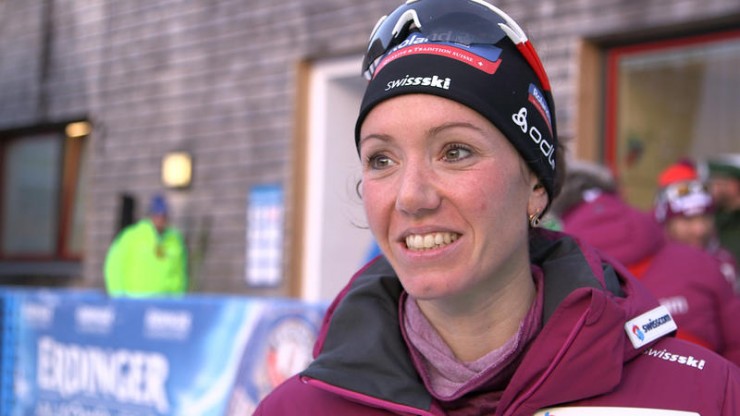
Behind her in fifth place and 1:23.8 minutes out of first, Switzerland’s Selina Gasparin shot clean, something she last achieved at the 2014 Olympics in Sochi, Russia, where she took silver in the individual competition. It was the best result for a Swiss athlete so far this season, which she achieved despite a crash on the first loop.
“In the fall in the downhill, the barrel of my rifle hit against my head,” Gasparin said in Swiss Ski Federation press release. “Probably that sorted out my brain cells.
“My shape is quite good, but the shooting is my problem,” Gasparin told the IBU. “Only in Sochi I shot clean, so it’s the second time in my life, and I’m really happy because I worked so hard for this.”
On being both a mom and a professional biathlete, Gasparin, 31, added, “It’s quite hard. I have not so much time for other things. I have, like, two full-time jobs, but for me it’s really nice and fun to do both.”
She is competing in the World Cup with her two younger sisters Elisa, 24, and Aita, 21.
Along with Wierer and Gasparin, three other women also shot clean: Russia’s Olga Podchufarova in 10th, Norway’s Synnøve Solemdal in 13th, and Kazakhstan’s Galina Vishnevskaya in 15th.
France’s Marie Dorin Habert placed sixth (+1:25.6) with the fastest course time, but two penalties, and remains in second in the overall World Cup standings behind Soukalová.
Starting just a few positions behind Wierer, Norway’s Tiril Eckhoff had the best chance to challenge the Italian, shooting clean and skiing fast to chase down on Wierer’s split times after each of the first three loops and stages. But three penalties in the final shooting ended Eckhoff’s hopes at a podium, and she ended up 21st (+2:55.1).
Crawford in Top 20; Reid’s World Cup Debut
While Crawford finished 18th to lead the North Americans on Thursday, she said her goals going in had been related to the process rather than results.
“My races before Christmas weren’t that great so my expectations were low,” she said in a Biathlon Canada press release.
A cold kept her from racing last week in Ruhpolding; instead she continued to train at home in Canmore, Alberta, before flying to Germany.
“It felt better than it has this year, I felt like I could start strong and keep that going better than the first 3 World Cups,” she explained of her race on Thursday. Her ski time ranked 31st overall. “Our skis were also good today, the techs did a good job!”
Like Wierer, Crawford explained that she generally doesn’t go into individual races any differently than into a sprint or pursuit race despite the harsh penalty for a miss:
“I approach individuals the same as any other race, you don’t want to change your mentality just because misses add one minute, you need to shoot just like you do in training, just like you do in any other race. This is also one of the easiest ranges on the World Cup, no wind almost ever, so I knew that 90% would be the very lowest I could shoot if I wanted a chance at the mass start, and even with that I am on the edge of making it!“
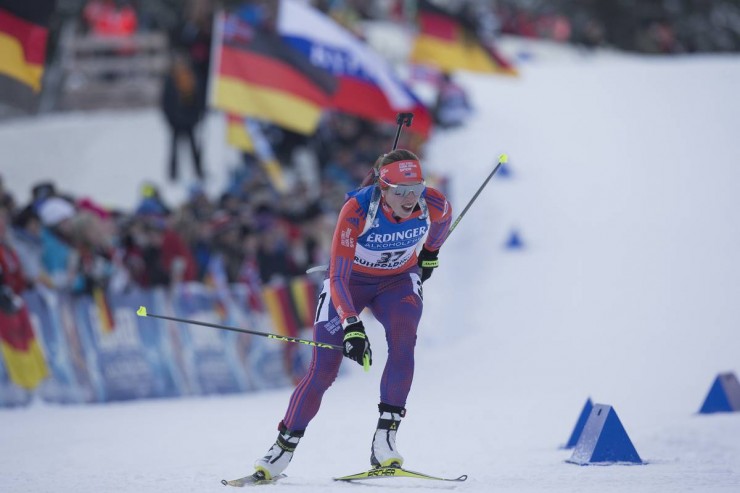
Coming off a career-best mass-start result of sixth last Sunday, American Susan Dunklee was the top U.S. women in 50th place (+5:13.9). Her course time ranked seventh-fastest overall, but five penalties kept her out of contention (1+1+2+1).
“This sport sure knows how to keep a person humble,” Dunklee said in a US Biathlon press release. “A mediocre range performance held me back today.”
In her very first World Cup, Joanne Reid started very late in bib 93 out of 96 starters, after first qualifying for and then being called up from the IBU Cup within the last few weeks. In fact, it was also her first race in the individual format ever, so she had to remind herself of some important details.
“Was I chanting prone, standing, prone, standing to myself (to remember the order) before the start? Yes, indeed!!” Reid, 23, wrote in an email.
She opted for a steady approach, though the former cross-country NCAA champion did ski the 47th-best time overall and a fast last loop: “I just wanted to try really hard not to miss. … And to do that I wanted to moderate my ski speed both coming into the range and a little bit on the standing loops, since standing is generally my weakest, and definitely slowest (slowest range time on the entire World Cup, thank you very much) section of a race. This is something I’ve been working on since [the US Biathlon tryouts in] Canmore, where I came flying into the range for a standing bout and hit only one target.”
She had one miss in the first prone shooting stage, then cleaned her first standing stage, before incurring two more penalties in the second prone shooting, and one more in the final standing stage (1+0+2+1).
“I’m just learning to deal with wind and corrections to the sights during racing, so any time there’s wind in the range it throws me off. But, I’m working on it,” she explained.
In the days before the race, Reid had a minor technical issue with her rifle, but she was able to get that fixed in time once she had the right tools available.
“Because of the way it’s assembled, it’s very hard to understand, my dad built and drilled all these pieces himself, and someone tried to put it back together incorrectly.”
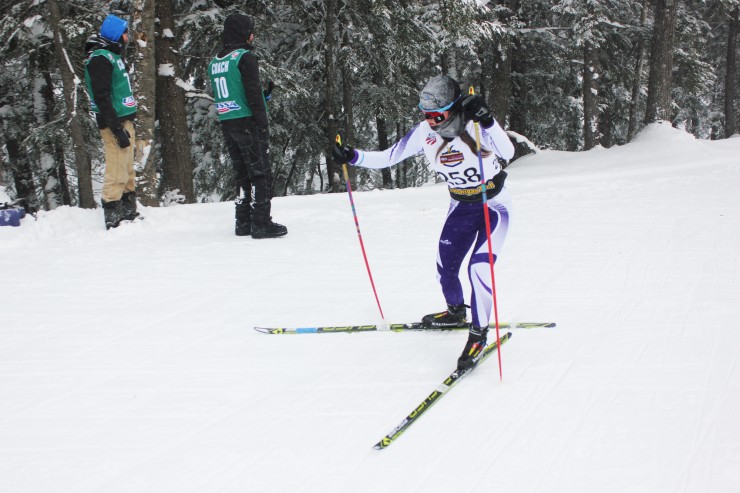
During the race, Reid tried not to get too influenced by the many spectators watching the race, who often audibly react to every shot — especially those of local biathletes — with cheers or sighs which can be distracting for other athletes on the range at the same time.
“The Colorado biathlon club cheers just as loud per bullet as Ruhpolding, actually, so I’d say I’m pretty used to it. KIDDING. ;)” she wrote.
Reid finished her first World Cup in 72nd place (+7:20.5), but ahead of a number of more experienced athletes.
“I’m just really excited to be here with all these amazing athletes, and thrilled to be in the sport of biathlon. It’s an amazing sport, with amazing people, that I find twice as fun and twice as difficult as just pure skiing,” she concluded in her email.
“Our rookie, Joanne Reid, who recently switched over from cross-country skiing, put together a great World Cup debut and has been impressive in training all week,” Dunklee commented. ”I am excited to see what more she will accomplish!”
Teammate Clare Egan was 74th, incurring a penalty in her first prone shooting and three in the first standing stage, before being able to adapt to the conditions and cleaning the next two (1+3+0+0).
The fourth American, Annelies Cook opened the race in bib 1 to a huge cheer by the audience, excited that the competition was about to begin. After incurring two penalties in her first prone shooting, she skied most of her race outside the focus of the TV cameras, finishing 88th with eight penalties (2+1+2+3).
Canada’s Megan Tandy, who skipped the first weekend in Ruhpolding, finished 73rd with four penalties, 0.4 seconds behind Reid and 2.1 seconds ahead of Egan. Also for Canada, Julia Ransom finished in 78th with five penalties, and Zina Kocher was 94th with nine penalties.
The second-straight IBU World Cup in Ruhpolding continues with the men’s relay on Friday (at 9:30 a.m. EST, streamed live at www.eurovisionsports.tv/ibu), followed by mass starts on Saturday (for which Dunklee is qualified via her World Cup standing, and Crawford is on a reserve standby list), and concluding with the women’s relay on Sunday.
Harald Zimmer
Harald has been following cross-country skiing and biathlon for some 20 years since the Olympic Winter Games in Albertville and Lillehammer. A graduate of Middlesex University London and Harvard University, he now lives near the Alps where he likes to go skiing, snowboarding and hiking. He is a former track athlete in middle-distance running, as well as a huge NBA fan.

